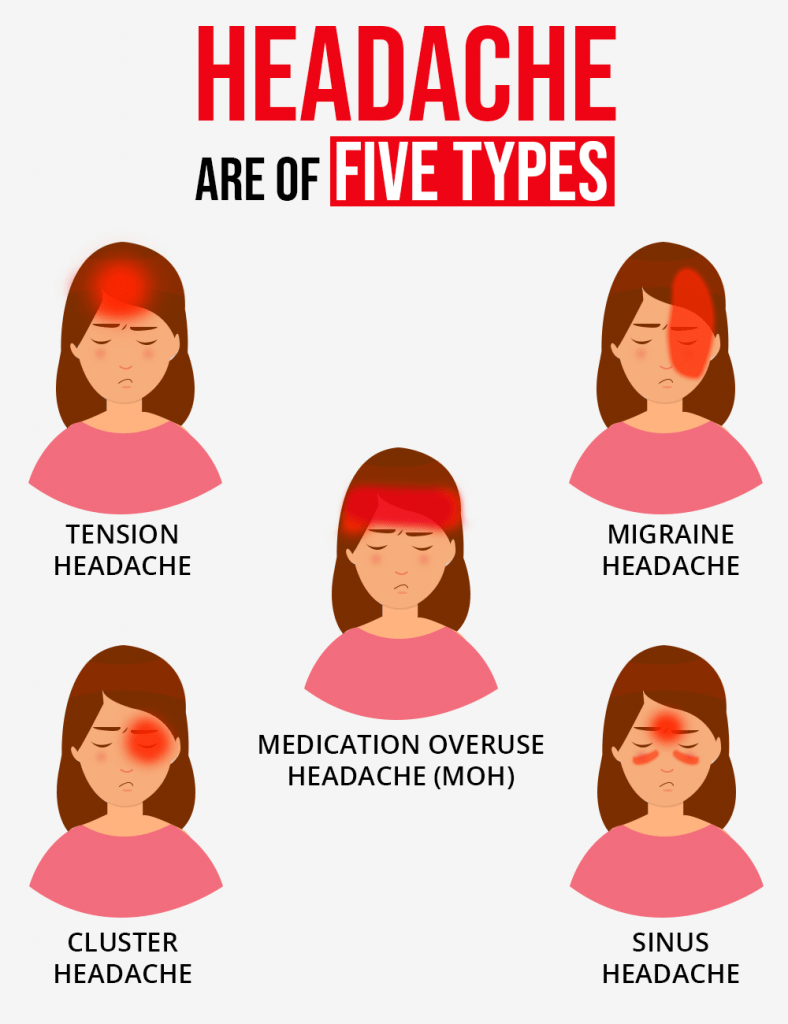Headaches and migraines, while common, can be incredibly debilitating, often hindering our ability to function optimally in our daily tasks. In our fast-paced world, where stress and environmental factors constantly challenge our well-being, these ailments have become all too frequent. While many people often turn to over-the-counter medications for quick relief, there’s a growing interest in natural and holistic remedies. These methods not only address the symptoms but often target the root causes, providing long-term solutions. In this comprehensive guide, we’ll explore a range of natural remedies that promise relief from these discomforts, allowing you to navigate your days with ease and vitality.
Understanding Different Types of Headaches:

Headaches, while common, come in various forms, each with its unique characteristics:
- Migraine Headaches: Often described as intense, pulsating pains, migraines can be debilitating. They typically manifest on one side of the head and may be accompanied by nausea. Physical activity often exacerbates the pain.
- Tension Headaches: Linked to stress, tension headaches are the most prevalent type. They’re often described as constant pressure or tightness around the head.
- Cluster Headaches: These are sharp, extremely painful headaches that occur in clusters, often around the eye. Symptoms can include redness and tearing of the eye.
- Sinus Headaches: Resulting from sinus inflammation, these headaches cause a throbbing pain in the forehead, accompanied by facial swelling and nasal congestion.
- Medication Overuse Headaches (MOH): Over-reliance on headache medications can lead to MOH. Interestingly, women are more susceptible to this type than men.
While it’s tempting to reach for over-the-counter painkillers, they can come with potential side effects. Natural remedies offer a safer alternative, providing relief without the risks associated with prolonged medication use. In this guide, we’ll delve into 19 effective natural remedies for headaches and migraines. These holistic solutions can be easily tried at home, offering a chance to experience their benefits firsthand.
Natural Remedies to Alleviate Headaches and Migraines: A Holistic Approach –
1. Embrace the Power of Massage:
Massage therapy can significantly reduce tension and promote circulation. For migraine sufferers, massaging reflex points on the hands and feet can offer relief. Regular massages can also decrease stress and improve sleep quality.
2. Ginger – Nature’s Pain Reliever:
Ginger is renowned for its anti-inflammatory properties. Drinking ginger tea or applying a ginger paste to the forehead can help alleviate headache symptoms.
3. Cool Down with Cold Compress:
Applying a cold pack to the forehead can provide instant relief. Ensure the cold pack is wrapped in a cloth to avoid direct contact with the skin.
4. Warmth for Tension Relief:
For tension headaches, a warm compress or heating pad on the neck can work wonders. The warmth helps relax tense muscles, providing relief.
5. Prioritize Sleep:
A consistent sleep routine is vital. Ensure you get 6-8 hours of uninterrupted sleep, as sleep disturbances can trigger headaches.
6. Relaxation Techniques:
Engage in relaxation practices like yoga, meditation, or deep breathing exercises. These techniques can reduce the frequency and severity of headaches by alleviating stress.
7. Diet Modifications:
Certain foods can trigger headaches. Avoiding chocolate, certain dairy products, and processed foods can make a difference. Opt for fresh, organic foods to keep headaches at bay.
8. Caffeine to the Rescue:
Moderate caffeine intake, like a cup of coffee or tea, can offer relief. However, excessive caffeine can have the opposite effect, so moderation is key.
9. Acupuncture – Traditional Healing:
This ancient Chinese technique can provide significant relief from migraines and tension headaches. It involves stimulating specific points on the body with thin needles.
10. Stay Hydrated:
Dehydration is a common headache trigger. Ensure you drink at least 8 glasses of water daily. Incorporate water-rich fruits and vegetables into your diet for added hydration.
11. Regular Exercise:
Physical activity releases endorphins, which act as natural painkillers. Regular exercise can reduce the frequency of headaches and improve overall well-being.
12. Magnesium – The Essential Mineral:
Magnesium deficiency can lead to headaches. Incorporate magnesium-rich foods like almonds, spinach, and avocados into your diet or consider supplements.
13. Basil’s Soothing Effect:
Basil, with its muscle-relaxant properties, can be an effective remedy. Drinking basil tea or using basil oil for massage can provide relief.
14. Flaxseeds – Omega-3 Powerhouse:
Rich in omega-3 fatty acids, flaxseeds can reduce inflammation, a common headache trigger. Consume them whole, ground, or as oil.
15. Herbal Teas for Relaxation:
Herbal teas like chamomile, peppermint, and lavender can soothe the nervous system, reducing headache frequency.
16. Essential Oils – Aromatherapy:
Inhaling lavender or peppermint oil can alleviate migraine pain. These oils can be diffused or applied topically for relief.
17. Vitamin E for Hormonal Balance:
Especially beneficial for women experiencing menstrual migraines, vitamin E can help balance hormones, reducing headache symptoms.
18. Dim Lights for Sensitivity:
Bright lights can exacerbate headaches. If you’re sensitive, consider dimming lights or using shades to reduce brightness.
19. Limit Alcohol Intake:
Excessive alcohol can lead to dehydration, triggering headaches. Moderation is essential to prevent these adverse effects.
Conclusion:
In the realm of health and well-being, natural remedies have stood the test of time, offering relief and healing without the side effects often associated with modern medications. As we’ve explored, there’s a plethora of options available for those seeking a more holistic approach to managing headaches and migraines. While these methods can be incredibly effective, it’s crucial to remember that every individual is unique. What works wonders for one might not be as effective for another. Therefore, it’s essential to experiment, listen to your body, and find what works best for you. And, as always, if symptoms persist or are severe, seeking advice from a healthcare professional is paramount. Embrace the power of nature, and may your journey toward a pain-free life be both enlightening and rejuvenating.


